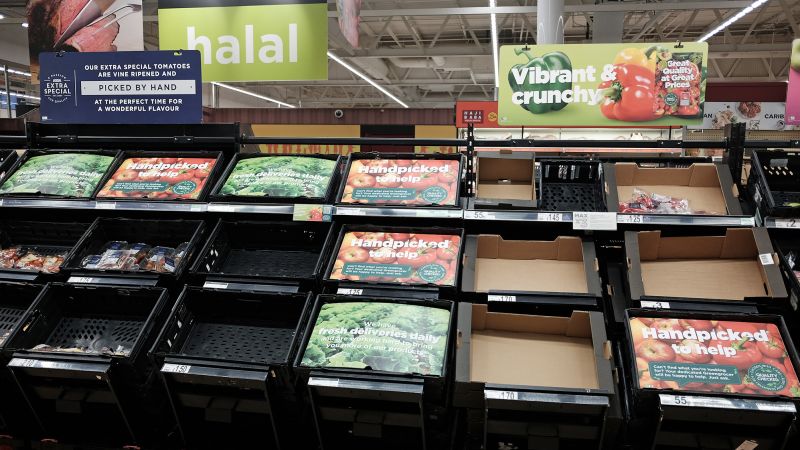Food shortages in Spain and North Africa: How supermarkets are responding to the recent weather events in Europe, North Africa, and South Asia, according to CNN
Major UK supermarkets have started rationing the sale of some staple fruits and salad vegetables because of poor weather in Spain and north Africa.
According to a CNN report on Wednesday, Tesco has capped the number of packs of vegetables at three per customer.
“Like other supermarkets, we are experiencing sourcing challenges on some products that are grown in southern Spain and north Africa,” an Asda spokesperson said.
Sainsbury’s
(JSAIY), the United Kingdom’s second-largest food retailer, told CNN it had no plans to ration the sale of fruit and vegetables.
In the four weeks to January 22, food price inflation hit 16.7%, according to Kantar. The data company started tracking the indicator in 2008.
Minette Batters, president of the National Farmers’ Union told the BBC Wednesday that the more food shortages we face, the higher food inflation will be.
Andrew Opie, the BRC’s director of food and sustainable living, told CNN that supermarkets are able to manage supply chain issues and are working with farmers to ensure customers have access to a wide range of fresh produce.
The main issue, says Harford, is a bad harvest out of Spain and Morocco, where Europe and the U.K. get a lot of their winter produce. A late frost and flooding killed a lot of the crops.
According to the British Retail Consortium (BRC), a trade group, UK supermarkets import 95% of their tomatoes and 90% of their lettuce in December, and typically import the same proportions in March.
James Bailey, executive director of supermarket Waitrose, told LBC radio Monday that snow and hail in Spain, as well as hail in parts of north Africa, had “wip[ed] out a large proportion” of key crops.
If it takes about two weeks, the other growing seasons in other areas of the world will have caught up, and we should be able to get that supply back in.
Reducing production across the farming sector is one example of the high input costs contributing to the fruit and vegetables shortages.
“Labor shortages and soaring energy prices are hitting the poultry industry, already reeling from avian influenza, as well as horticultural businesses and pig farms,” Batters said in a speech Tuesday.
The price of natural gas — a key input for nitrogen-based fertilizers — shot up following Russia’s invasion of Ukraine last year. Though gas prices have fallen back in recent weeks, they are still triple their historical average, while fertilizer costs are up 169% since 2019, Batters noted.
After all other parts of Europe are also experiencing shortages, Tim Harford thinks that is not the main reason for a tight tomato supply.
In a statement Wednesday, Defra stated that there was disruption in other countries and that it was helping UK growers by expanding a visa scheme for seasonal workers.
The supply crunch has not been attributed to the exit of the UK from the EU. NFU and some campaign groups argue that it has made labor shortages worse.
Batters said that direct subsidy payments to UK farmers from the European Union are being phased out, which has increased uncertainty for farmers. The United Kingdom will fully implement its own subsidy scheme by the year 2024.
What will we learn if we eat turnips instead of turnips in a clammy British climate? A warning from U.K. minister Therese Coffey
Until then, U.K. minister Therese Coffey suggested Brits take a page from the past and eat turnips instead, which grow more easily in the clammy British climate.
